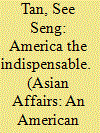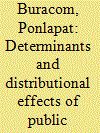|
|
|
Sort Order |
|
|
|
Items / Page
|
|
|
|
|
|
|
| Srl | Item |
| 1 |
ID:
107986


|
|
|
| 2 |
ID:
107982


|
|
|
|
|
| Publication |
2011.
|
| Summary/Abstract |
Social spending in Thailand is allocated in response to several demand and supply factors. Globalization and inequality tend to compel the governments, both elected and nonelected, to increase generous education, health, and welfare programs for social sectors that fall behind. An increase in revenue from direct taxes and the previous year's spending level has also had a positive effect on the current rate of public spending on education, health, and welfare in Thailand. Overall public spending on education, health, and welfare is not very well targeted, despite the increase in the shares of education, health, and welfare spending and the recent introduction of new social programs in Thailand. These increases had the stated objective of increasing access of the poor to education, health, and welfare services, including an expansion of basic education from nine to twelve years, a student loan program, a universal health-insurance scheme, and the expansion of other welfare services. Public spending on basic education is primarily propoor, but the disparities in access to education continue to exist at all levels of education. Although the resulting benefit incidence of public spending on health services in 2007 was less prorich compared with the past, the majority of public health spending still favors higher income classes. The social security scheme coverage is also limited to a small section of the Thai labor force. These findings pose a challenge to policymakers, and the author therefore explores their policy implications.
|
|
|
|
|
|
|
|
|
|
|
|
|
|
|
|
| 3 |
ID:
107984


|
|
|
|
|
| Publication |
2011.
|
| Summary/Abstract |
In foreign policy realm, Chinese think tanks are day by day getting more influential, complex, and numerous. This article is an effort to trace the nature, scope, typology, and influence of policy advice institutions in China against the time blocks of past, present, and future. After defining the factors working behind the present growth of think tanks in China, the present era is also substantiated for all non-Chinese actors as the unprecedented time of access and interaction since 1949.
|
|
|
|
|
|
|
|
|
|
|
|
|
|
|
|
|
|
|
|
|